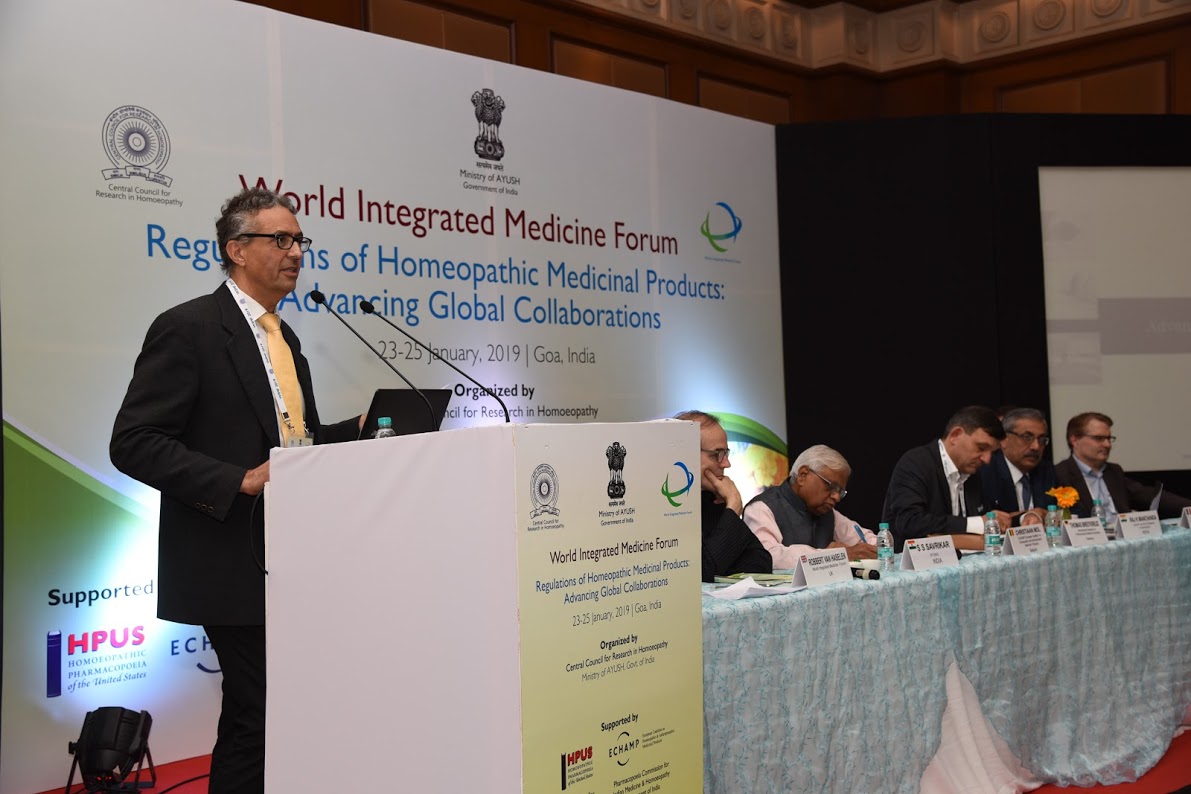A spotlight on India
India has been described as the ‘super hub’ of homeopathy with one of the most advanced ‘gold standard’ regulatory systems in the world. 150 million people use homeopathy there in their daily healthcare, delivered by around 300,000 medical practitioners in primary healthcare settings, including hospitals. The Indian government is making a strong commitment to homeopathy, as described at the World Integrated Medicine Forum in Goa in January.
Homeopathy is practised in about 80 countries worldwide but nowhere more than in India, where over 150 million people use homeopathy in daily healthcare, delivered by around 300,000 medical practitioners in primary healthcare settings, including hospitals.
The World Integrated Medicine Forum on the regulation of homeopathic medicinal products, held in Goa in January this year, was an opportunity to cast a light on the wide variety of regulation for homeopathic medicinal products in different countries, which ranges from highly advanced structures to none at all. It was a chance for regulatory experts to learn from one another, and in particular to learn from the host nation, India, described by one speaker as being the ‘super hub’ of homeopathy and having one of the most advanced ‘gold standard’ regulatory systems in the world.
This article briefly summarises the current structure for the supervision and delivery of homeopathy in India, as presented at the conference.
Independent systems for supervision and development
The Government of India is alone in the world in having a ministry dedicated to ayurveda, yoga, naturopathy, unani, siddha and homeopathy (Ministry of AYUSH), allowing for a significant focus on supporting these health systems. On the one hand, it supports autonomous research councils to undertake organised research of each system and on the other it has established statutory councils in these disciplines to regulate medical education and register practitioners. In addition it oversees the regulation of the medicinal products.
Medical education
AYUSH practitioners all have an equal status as AYUSH oversees a very high proportion of medical education through affiliated colleges (54% of all medical education colleges). In particular, there has been a rapid growth of homeopathic colleges over the past 20 years, resulting today in 235 colleges for homeopathic education, that is 36% of all affiliated medical education colleges. These colleges train over 32,000 medical students in homeopathy each year (34% of the total) and there are currently nearly 300,000 homeopathic practitioners registered with the central state body.
Research
In addition a major focus of AYUSH is its investment in both fundamental and basic research. Under its auspices, the Central Council for Research in Homeopathy (CCRH), which has been active since 1969 and was constituted in 1978, conducts scientific and ethical research to enhance the success rate of clinical practice in homeopathy and to promote safe, quality assured and effective treatment.
CCRH is comprised of 26 research institutes in different parts of India, including national and regional bodies. They carry out basic, clinical, drug and medicinal plant research and there are treatment centres responsible for over 1 million homeopathic consultations a year; in all CCRH is directly responsible for 160 studies on different aspects of homeopathy, and has collaborated in addition with reputed scientific institutes on a further 37 studies.
It also seeks to provide support at global level and to foster fundamental, basic and clinical research in the field internationally as well as in India. For example in November last year, Dr Raj Manchanda, the Director General of CCRH, wrote directly to the Australian National Health & Medical Research Council (NHMRC) inviting it to ‘open a dialogue for exchange of knowledge and experience regarding the health and economic benefits of the integration of traditional medical systems into mainstream healthcare’. He also challenged Australia’s approach to reforms on homeopathy and noted concern over the reliability of NHMRC’s 2015 review of homeopathy.
A gold standard regulatory system
Statutory provisions have been made to ensure quality and safety of drugs in India in the Drug and Cosmetic Act. India has one of the most advanced regulatory systems in the world, with well-structured acts, rules specific to homeopathy, a homeopathic pharmacopoeia with over 1000 remedies, specific regulation for education and practice and homeopathy specific GMP guidelines. The Homeopathic Pharmacopoeia of India is recognised and followed in many countries and the government has entered into a number of Memoranda of Understanding with authorities worldwide, with which it is in regular contact, most recently with the Homeopathic Pharmacopoeia of the United States.
India recognises the definition of homeopathic medicines in the European and French Pharmacopoeias alongside the included German, UK and US pharmacopoeias, which are already included.
The future role of homeopathy
In India, there is a strong commitment to homeopathy, which it is thought will help provide a solution to, among others, the concern of growing resistance to antibiotic drugs. Homeopathy can help by treating day to day infections like colds, coughs and otitis reducing the use of antibiotics. It also has its role to play in the challenge of multimorbidity, offering enhanced quality and patient satisfaction.
India is the world’s second most populous country (1.36 billion), second only to China (1.39 billion). With this commitment not just to homeopathy but to other traditional medicine systems, it is investing in forward-looking programmes to integrate its rich traditional systems in healthcare, alongside conventional medicine. As Dr Manchanda wrote to NHMRC, “India has a vast wealth of scientific knowledge and direct experience in this field. It is willing to share this knowledge upon request.”
Source: WIMF Presentation, Dr R K Manchanda, Director General, Central Council for Research in Homeopathy, Ministry of AYUSH, Government of India and co-chair, Drug Technical Advisory Board

